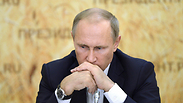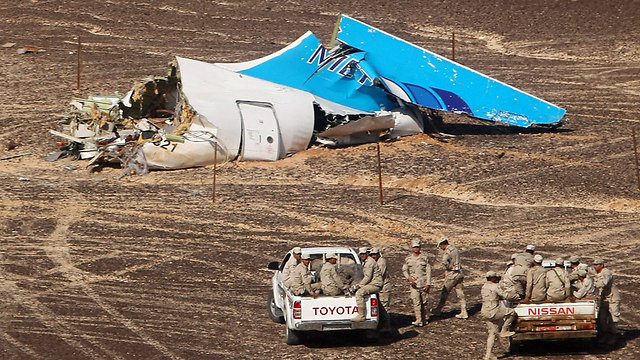
Putin is likely losing sleep over the threat to uncover new weak spots.
צילום: EPA
Sinai plane crash: Why is Putin so silent?
Analysis: The Russian president is not afraid of making decisions and taking risks. If he is stalling now, it means that complicated aspects require him to consider his moves before deciding on a response.
Since the Russian passenger plane crashed in Sinai more than 10 days ago, Vladimir Putin has appeared only once on Russian media. In a short eulogy on television, he offered his condolences for the death of the 224 passengers, and has not been seen on the media since. Such a silence is uncharacteristic of the Russian president's style.

Putin recently gave an interview in the city of Sochi, where he participated in an international conference which was also attended by officials from the academic world. One of the American academics asked how he had decided to launch the battle to regain control of the Crimea Peninsula, and Putin responded that it was a spontaneous decision - he didn't consult his people about it and issued orders for the operation stage by stage. He was surprised by its tremendous success himself, he said.
Putin is not afraid of making decisions and taking risks. If he is stalling now, it means that complicated aspects require him to consider his moves before deciding on a response. The announcement made by Prime Minister Dmitry Medvedev, who admitted Monday that the crash may have been a terror attack, only emphasized the president's silence.
The Russian leader has been caught in a situation he does not want to be in. First of all, he was surprised: He wasn't expecting such a blow. Putin prefers to surprise. He has been quoted as saying that he learned from his experience On the streets of St. Petersburg that a person who is destined to fight should show up first on the battlefield and take initiative. He believes this strategy has proved itself in recent years in the Middle East as well. In Syria, Russia seems to have succeeded in leading so far, while the United States is perceived as responding with hesitant moves.

Russian plane crash in Sinai. Exposed vulnerability in an area Russia never imagined (Photo: AP) (צילום: AP)
In Putin's eyes, the march of leaders to Moscow, from his clear allies in Iran to his rivals on Syrian soil - Saudi Arabia's representatives - demonstrated the change in Russia's standing in the region. He was even crowned the strongest leader in the world in an international survey conducted recently, while US President Barack Obama was pushed back.
While Putin remained silent, Obama and other Western officials declared that there was a high probability that the plane crash was a terror attack carried out by the Islamic State. Western media sources reported of evidence confirming this assumption, allegedly using classified intelligence information. These reports pushed the Russians into a corner, and Putin had no other choice but to order the suspension of Russian civil flights to Sinai.
Putin is apparently still internalizing the meaning of the disaster, for him and for his policy, and is taking a timeout for this purpose. There is nothing coincidental in Russia. On November 9, Sergei Chemezov, the chief executive of a Russian state-owned defense conglomerate, announced that the contract to supply Iran with S-300 surface-to-air missile systems had not only been signed but had already reached the execution stage. Israel waged a difficult battle against the deal for years, and it is definitely unhappy with this move.
Chemezov is a senior figure in Putin's internal circle and has been a personal friend of the Russian president since the two served together in the KGB in East Germany. He is included on the list of officials subject to personal sanctions by the US for their involvement in the Ukraine issue. Chemezov spoke during a visit to an aerial exhibition in Dubai and his comments created a buzz in the Persian Gulf's sensitive area. It was a "we are still here!" type of declaration.
The options Putin is facing are not easy . If he responds powerfully, while escalating the Russian involvement in Syria, he will risk increasing the losses in the fighting and creating objection among the public opinion in his country. If he ignores the incident, he will risk losing his international and internal prestige, and the initial, aggressive effect of reinforcing the Russian presence in Syria could disappear.
The plane disaster exposed vulnerability in an area Russia never imagined. Solving this operational problem is not simple, and Putin is likely losing sleep over the threat to uncover new weak spots.
Efraim Halevy is a former Mossad chief.










